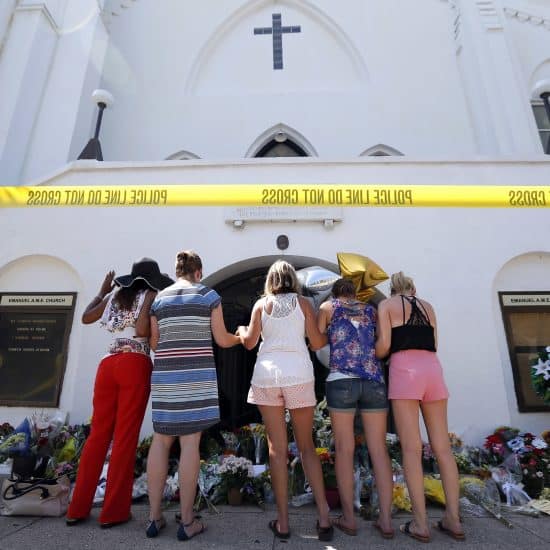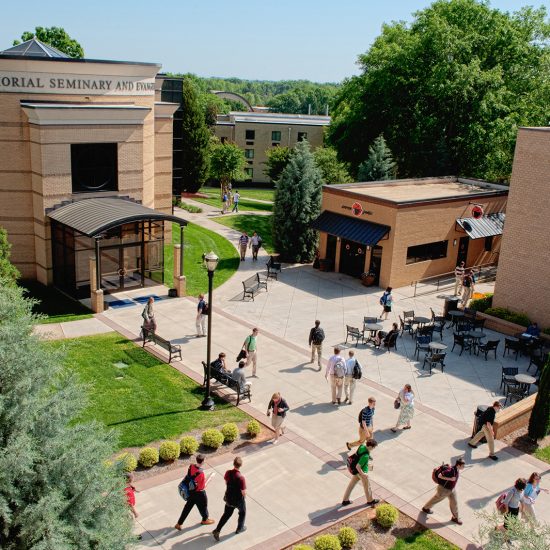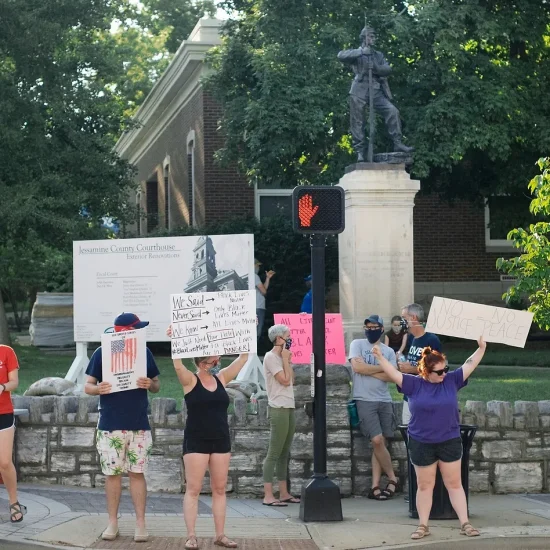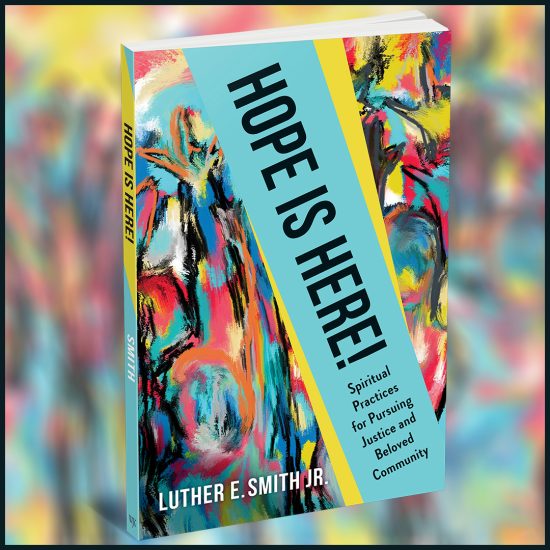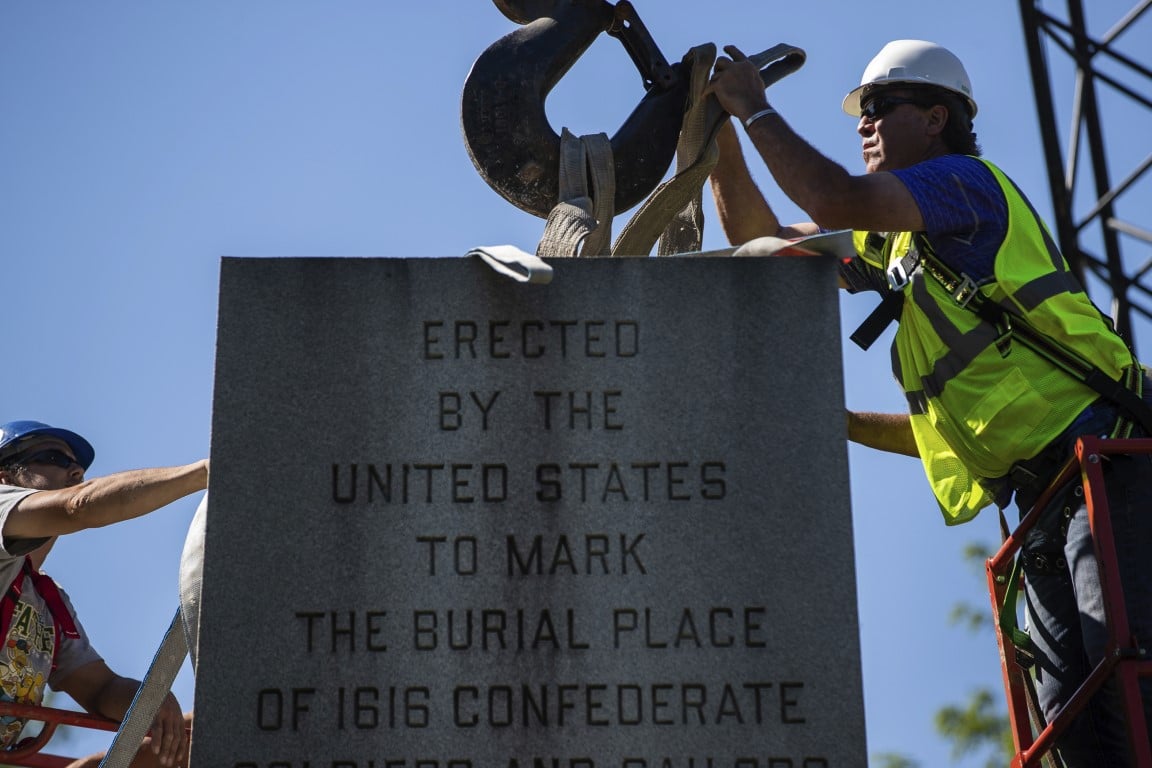
Amid the recent marches in all 50 states and several other countries against racial injustices, we’ve seen the crumbling of some of the building blocks of white supremacy. Literally.

Brian Kaylor
Monuments of stone and bronze have been defaced with graffiti, toppled by protesters, or removed by government officials. The Spirit of God sweeps across the land as we follow the ancient Hebrew people in tearing down the graven images to the gods of slavery.
“Destroy completely all the places on the high mountains, on the hills and under every spreading tree, where the nations you are dispossessing worship their gods,” we hear in Deuteronomy 12. “Break down their altars, smash their sacred stones and burn their Asherah poles in the fire; cut down the idols of their gods and wipe out their names from those places. You must not worship the Lord your God in their way.”
The words of Scripture are playing out before us for those with eyes to see:
- The University of Alabama removed plaques on its campus honoring Confederates for fighting to defend slavery.
- Protesters tore down a statue of a slave trader in Bristol, England, and then tossed it into the sea — a fate suffered by hundreds of thousands of enslaved Africans who died during the Middle Passage.
- Officials removed a monument to Confederate soldiers in Indianapolis, Indiana.
- Protesters toppled a Confederate statue in Richmond, and government leaders pledged to remove other Confederate statues in the city.
- Officials in a London suburb removed a statue of a slave trader.
- Officials in two counties in the Dallas-Forth Worth area voted to remove Confederate statues from their courthouses.
The old things have passed away; behold, all things have become new!
 This holy moment of the crowds is — like that which gathered in exuberance on Palm Sunday — giving breath to shouts too long suppressed. It’s like how Clarence Jordan, the Baptist minister who started Koinonia Farm and created the Cotton Patch Gospel translation of the Bible, explained Jesus’s defense of his mob of supporters on that ride into Jerusalem.
This holy moment of the crowds is — like that which gathered in exuberance on Palm Sunday — giving breath to shouts too long suppressed. It’s like how Clarence Jordan, the Baptist minister who started Koinonia Farm and created the Cotton Patch Gospel translation of the Bible, explained Jesus’s defense of his mob of supporters on that ride into Jerusalem.
“The authorities came out and tried to tell him to shut up and stop parading without a permit,” Jordan declared. “And Jesus said, ‘Listen, boys, you’re behind the times. If I tell my disciples to shut up, the very rocks will cry out!’ He’s saying, man, this movement’s gone too far, I can’t stop it by trying to squelch a few people here. All nature’s been caught up into this movement. It’s on the move. And if these people hush, the rocks will take up the song of freedom and first thing you know the Confederate monument in the square will start singing, ‘We Shall Overcome.’”
Now that would be an apocalyptic moment! Like water from a rock. Like the dream of Baptist preacher Martin Luther King Jr. of a mountain of despair remade into a stone of hope.
But like the song declares, “Ain’t No Rock Gonna’ Shout for Me.” Ain’t no monument gonna’ speak for me about justice because I remained mute. And when that monument preaches a message of injustice, we should also work toward its removal.
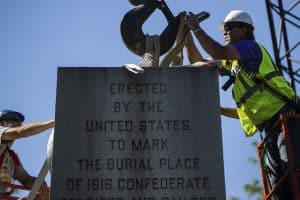
A monument dedicated to Confederate soldiers who died at a Union prison camp in Indianapolis is dismantled from Garfield Park in Indianapolis on Monday, June 8, 2020. (Mykal McEldowney/The Indianapolis Star via AP)
Yet, I fear that like the religious leaders on the side of the road back on that Palm Sunday, many Christians aren’t joining this critical march. Too many of our institutions have not dealt with their historic ties to slavery. And too many still feature honors to slaveholders and those who fought to defend that evil institution. We could find a society someday where the primary honors to slaveholders still standing are only on the campuses of Christian schools and churches.
Southern Baptist Theological Seminary in Louisville, Kentucky, admitted its slaveholding ties, but then refused to apologize, change honors to slaveholders, or work to repair the damage.
William Jewell College in Liberty, Missouri, ignored the challenge for it to explore its slavery past and consider acts of repentance and repair.
And numerous other examples could be listed. Until we honestly reckon with our past, we aren’t going to make the progress needed in the future.
But we could also chart a new course by doing more than just toppling statues and removing honors. What if we instead took up the prophetic challenge to imagine and build a new world?
Consider the vision of Isaiah and Amos of a day when people would beat their swords into plowshares. Michael Martin and Shane Claiborne took up that challenge for today by beating guns into garden tools. What if we could do the same with the memorials to the Lost Cause? What if we could remake these markers into something new? What if we could help the stones and metals shout a new message? Imagine the sacred things we could make from these new creations.
Let’s not just accept the things of the past. Let’s imagine a better world. And then let us tear down and remake that which stands in the way of building a more just society.

